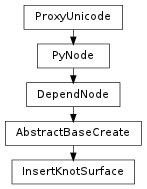pymel.core.nodetypes.InsertKnotSurface¶

- class InsertKnotSurface(*args, **kwargs)¶
class counterpart of mel function insertKnotSurface
The insertKnotSurface command inserts knots (aka isoparms) into a surface given a list of parameter values. The number of knots to add at each parameter value and whether the knots are added or complemented can be specified. The name of the surface is returned and if history is on, the name of the resulting dependency node is also returned. You must specify one, none or all number of knots with the “-nk” flag. eg. if you specify none, then the default (one) knot will be added at each specified parameter value. If you specify one “-nk” value then that number of knots will be added at each parameter value. Otherwise, you must specify the same number of “-nk” flags as “-p” flags, defining the number of knots to be added at each specified parameter value. You can insert up to “degree” knots at a parameter value that isn’t already an isoparm. eg. for a degree 3 surface, you can insert up to 3 knots. Use this operation if you need more CVs in a local area of the surface. Use this operation if you want to create a corner in the surface. Note: A single insertKnotSurface command cannot insert in both directions at once; you must use two separate commands to do this.
- getAddKnots(**kwargs)¶
Whether to add knots or complement. Complement means knots will be added to reach the specified number of knots.Default:true
Derived from mel command maya.cmds.insertKnotSurface
- getCaching(**kwargs)¶
Modifies the node caching mode. See the node documentation for more information.Note:For advanced users only.
Derived from mel command maya.cmds.insertKnotSurface
- getDirection(**kwargs)¶
Direction in which to insert knot: 0 - V direction, 1 - U directionDefault:1Advanced flags
Derived from mel command maya.cmds.insertKnotSurface
- getInsertBetween(**kwargs)¶
If set to true, and there is more than one parameter value specified, the knots will get inserted at equally spaced intervals between the given parameter values, rather than at the parameter values themselves.Default:false
Derived from mel command maya.cmds.insertKnotSurface
- getNodeState(**kwargs)¶
Modifies the node state. See the node documentation for more information.Note:For advanced users only.Common flags
Derived from mel command maya.cmds.insertKnotSurface
- getNumberOfKnots(**kwargs)¶
How many knots to insertDefault:1
Derived from mel command maya.cmds.insertKnotSurface
- getParameter(**kwargs)¶
Parameter value(s) where knots are addedDefault:0.0
Derived from mel command maya.cmds.insertKnotSurface
- setAddKnots(val=True, **kwargs)¶
Whether to add knots or complement. Complement means knots will be added to reach the specified number of knots.Default:true
Derived from mel command maya.cmds.insertKnotSurface
- setCaching(val=True, **kwargs)¶
Modifies the node caching mode. See the node documentation for more information.Note:For advanced users only.
Derived from mel command maya.cmds.insertKnotSurface
- setDirection(val=True, **kwargs)¶
Direction in which to insert knot: 0 - V direction, 1 - U directionDefault:1Advanced flags
Derived from mel command maya.cmds.insertKnotSurface
- setInsertBetween(val=True, **kwargs)¶
If set to true, and there is more than one parameter value specified, the knots will get inserted at equally spaced intervals between the given parameter values, rather than at the parameter values themselves.Default:false
Derived from mel command maya.cmds.insertKnotSurface
- setNodeState(val=True, **kwargs)¶
Modifies the node state. See the node documentation for more information.Note:For advanced users only.Common flags
Derived from mel command maya.cmds.insertKnotSurface
- setNumberOfKnots(val=True, **kwargs)¶
How many knots to insertDefault:1
Derived from mel command maya.cmds.insertKnotSurface
- setParameter(val=True, **kwargs)¶
Parameter value(s) where knots are addedDefault:0.0
Derived from mel command maya.cmds.insertKnotSurface